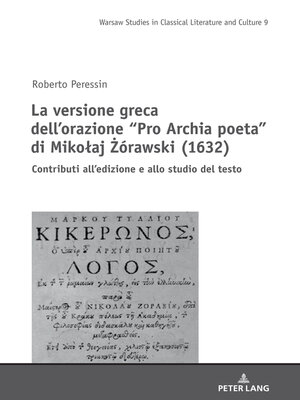La versione greca dellorazione Pro Archia poeta di Mikołaj Żórawski (1632)
ebook ∣ Contributi alledizione e allo studio del testo · Studies In Classical Literature and Culture
By Mikolaj Szymański

Sign up to save your library
With an OverDrive account, you can save your favorite libraries for at-a-glance information about availability. Find out more about OverDrive accounts.
Find this title in Libby, the library reading app by OverDrive.



Search for a digital library with this title
Title found at these libraries:
| Library Name | Distance |
|---|---|
| Loading... |
Nel solco degli studi sul "greco umanistico", che negli ultimi decenni hanno conosciuto un notevole e fervido sviluppo, il volume presenta il caso di una rara traduzione in greco classico della celebre orazione "Pro Archia poeta" di Cicerone. Com'è noto, a partire da Petrarca e per generazioni essa costituì un'ode alla bellezza e al giovamento procurati dall'arte e dalla poesia. Lo studio, oltre a proporre il testo, accompagnato da un'approfondita analisi linguistico-filologico-stilistica, mira a far luce sul contesto storico-letterario in cui operò l'autore, il polacco Mikołaj Z˙órawski (1595-1665). Figura poco nota del primo barocco sarmatico, fu non soltanto astrologo e medico, ma altresì appassionato traduttore di Cicerone all'Accademia di Cracovia.
In the wake of the studies on Humanist Greek, which have recently known a lively development, the volume presents the case of a rare Greek translation of Cicero's speech "Pro Archia poeta". As is known, starting from Petrarch and for generations the oration represented an ode to the beauty and the benefits deriving from art and poetry. The book provides the text, accompanied by an in-depth linguistic and stylistical analysis, and it also sheds light on the historical and literary background in which the author worked. The Pole Mikołaj Z˙órawski (1595-1665), an interesting though little known figure of the early Polish Baroque, was not only an astrologer and a physician, but also a passionate translator of Cicero at the Academy of Cracow.







